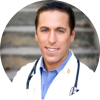
As the twentieth century came to a close, scientists began using DNA sequencing to probe deeper into aspects of biology, such as cancer genetics. One of the first cancer breakthroughs connected to sequencing was the identification of mutations to the genes BRCA1 on chromosome 13 and BRCA2 on chromosome 17, both of which indicate a person has an elevated risk of breast cancer.
A main purpose of genetic testing today is to identify diseases caused by DNA mutations, or variants. These variants can be either inherited or epigenetic, that is, caused by outside factors such as exposure to radiation or pollution. Many, like the BRCA1 and BRCA2 variants, can lead to a genetic condition. For instance, some variants of genes on Chromosome 6 can result in diabetes, spinocerebellar ataxia, congenital adrenal hyperplasia, or epilepsy. Variants of certain genes on Chromosome 7 can lead to Pendred syndrome, obesity, cystic fibrosis, or Williams syndrome.
DNA Insights to Help You Live a Healthier Life
Heredity is not destiny. Genetic testing can help you identify any current or potential health issues associated with your genome so you can live a healthier life. If you choose to have Whole Genome Sequencing, your complete genome of 30,000 genes will be tested and 3 billion genetic variants identified. You can then use your sequencing data to explore the potential locked inside your genes.
And with Whole Genome Sequencing, you will never need to take another DNA test. 100 percent of your DNA is included in your raw data. That means if you get sequenced today and a new gene is discovered tomorrow, all we have to do is to analyze your existing data to provide you with insights into the newly discovered gene.

With Whole Genome Sequencing, you (and your healthcare provider) can choose to do any or all of the following:
-
Monitor and screen for conditions, including rare genetic diseases. By catching a condition early, you can treat it quickly and minimize its impact.
-
Treat existing conditions by choosing interventions that are right for you and avoiding those that will be ineffective or have an increased chance of side effects.
-
Identify medications and dosages for current or potential health conditions that may work better for you and learn which potential side effects you may be prone to given your genetic makeup.
-
Discover complementary interventions for certain conditions that may not yet be accepted by Western medicine, but which may be especially beneficial to you.
-
Find out if you are a carrier of a hereditary genetic disorder that you could pass on to your children. If you have a family history of a condition, such as sickle cell anemia or cystic fibrosis, knowing if you and/or your partner carry the variant can help you make informed decisions.
-
Explore family planning options that may reduce the risk that your future children may have a condition or birth defect.
-
Learn about lifestyle modifications, such as changes in diet or performing certain exercises, that can help you address or prevent conditions to which you are genetically prone.
-
Find out about common misconceptions related to the prevention or treatment of a particular condition. Knowing about misconceptions can help you avoid spending time and money on things that just don’t work.
It's important to realize that having a gene variant connected to a particular disease doesn’t necessarily mean you will develop that disease. However, it does indicate that you may have a higher than average risk. If you should receive a DNA report indicating the presence of a concerning gene variant, you may want to seek genetic counseling from a healthcare provider to discuss the implications and to learn about any preventative measures you can take.
 About The Author
About The Author
Dr. Brandon Colby MD is a US physician specializing in the personalized prevention of disease through the use of genomic technologies. He's an expert in genetic testing, genetic analysis, and precision medicine. Dr. Colby is also the Founder of Sequencing.com and the author of Outsmart Your Genes.
Dr. Colby holds an MD from the Mount Sinai School of Medicine, an MBA from Stanford University's Graduate School of Business, and a degree in Genetics with Honors from the University of Michigan. He is an Affiliate Specialist of the American College of Medical Genetics and Genomics (ACMG), an Associate of the American College of Preventive Medicine (ACPM), and a member of the National Society of Genetic Counselors (NSGC).